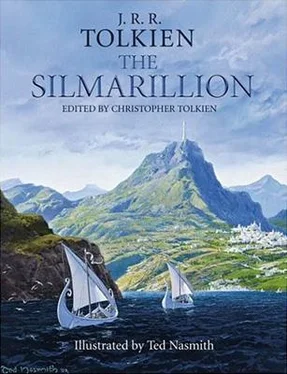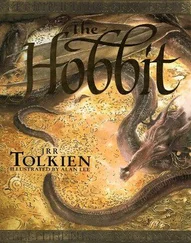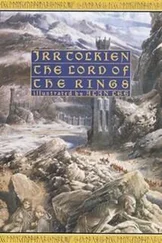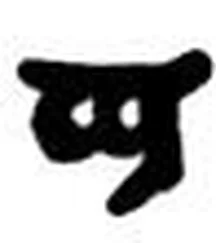arien (the Maia of the Sun) is derived from a root as- seen also in Quenya árë 'sunlight'.
atar 'father' in Atanatári (see Atani in Index), Ilúvatar.
band 'prison, duress' in Angband; from original mbando, of which the Quenya form appears in Mandos (Sindarin Angband= Quenya Angamando) .
bar 'dwelling' in Bar-en-Danwedh. The ancient word mbár (Quenya már, Sindarin bar) meant the 'home' both of persons and of peoples, and thus appears in many place-names, as Brithombar, Dimbar (the first element of which means 'sad, gloomy'), Eldamar, Val(i)mar, Vinyamar, Mar-nu-Falmar. Mardil, name of the first of the Ruling Stewards of Gondor, means 'devoted to the house' (i.e. of the Kings).
barad 'tower' in Barad-dûr, Barad Either Barad Nimras; the plural in Emyn Beraid.
beleg 'mighty' in Beleg, Belegaer, Belegost, Laer Cú Beleg.
brago 'sudden' in Dagor Bragollach.
brethil probably means 'silver birch'; cf. Nimbrethil the birchwoods in Arvernien, and Fimbrethil, one of the Entwives.
brith 'gravel' in Brithiach, Brithombar, Brithon.
(For many names beginning with C see entries under K)
calen (galen) the usual Sindarin word for 'green', in Ard-galen, Tol Galen, Calenardhon; also in Parth Galen ('Green Sward') beside Anduin and Pinnath Gelin ('Green Ridges') in Gondor. See kal-.
cam (from kamba) 'hand', but specifically of the hand held cupped in the attitude of receiving or holding, in Camlost, Erchamion.
carak- This root is seen in Quenya carca 'fang', of which the Sindarin form carch occurs in Carcharoth, and also in Carchost ('Fang Fort', one of the Towers of the Teeth at the entrance to Mordor). Cf. Caragdûr, Carach Angren ('Iron Jaws', the rampart and dike guarding the entrance to Udun in Mordor), and Helcaraxë.
caran 'red', Quenya carnë, in Caranthir, Carnil, Orocarni; also in Caradhras, from caran-rass, the 'Red-horn' in the Misty Mountains, and Carnimirie 'red-jewelled', the rowan-tree in Treebeard's song. The translation of Carcharoth in the text as 'Red Maw' must depend on association with this word; see carak-.
celeb 'silver' (Quenya telep, telpë, as in Telperion) in Celeborn, Celebrant, Celebros. Celebrimbor means 'silver-fist', from the adjective celebrin 'silver' (meaning not 'made of silver' but 'like silver, in hue or worth') and paur (Quenya quare) 'fist' often used to mean 'hand'; the Quenya form of the name was Telperinquar. Celebrindal has celebrin and tal, dal 'foot'.
coron 'mound' in Corollairë (also called Coron Oiolairë, which latter word appears to mean 'Ever-summer', cf. Oiolossë); cf. Cerin Amroth, the great mound in Lothlórien.
cú 'bow' in Cúthalion, Dor Cúarthol, Laer Cú Beleg.
cuivië 'awakening' in Cuiviénen (Sindarin Nen Echui ) . Other derivatives of the same root are Dor Firn‑i‑Guinar; coire, the first beginning of Spring, Sindarin echuir , The Lord of the Rings Appendix D; and coimas 'life-bread', Quenya name of lembas.
cul- 'golden-red' in Culúrien.
curu 'skill' in Curuftn(we), Curunír.
dae 'shadow' in Dor Daedeloth, and perhaps in Daeron.
dagor 'battle'; the root is ndak-, cf. Haudh-en-Ndengin. Another derivative is Dagnir ( Dagnir Glaurunga 'Glaurung's Bane').
del 'horror* in Deldúwath; deloth 'abhorrence' in Dor Daedeloth.
dîn 'silent' in Dor Dínen; cf. Rath Dínen, the Silent Street in Minas Tirith, and Amon Dîn, one of the beacon-hills of Gondor.
dol 'head' in Lórindol; often applied to hills and mountains, as in Dol Guldur, Dolmed, Mindolluin (also Nardol, one of the beacon-hills of Gondor, and Fanuidhol, one of the Mountains of Moria).
dôr 'land' (i.e. dry land as opposed to sea) was derived from ndor; it occurs in many Sindarin names, as Doriath, Dorthonion, Eriador, Gondor, Mordor, etc. In Quenya the stem was blended and confused with a quite distinct word nórë meaning 'people'; in origin Valinórë was strictly 'the people of the Valar', but Valandor 'the land of the Valar', and similarly Númen(n)órë 'people of the West', but Númendor 'land of the West'. Quenya Endor 'Middle-earth' was from ened 'middle' and ndor; this in Sindarin became Ennor (cf. ennorath 'middle lands' in the chant A Elbereth Gilthoniel ) .
draug 'wolf' in Draugluin.
dú 'night, dimness' in Deldúwath, Ephel Dúath. Derived from earlier dömë, whence Quenya lómë; thus Sindarin dúlin 'nightingale' corresponds to lómelindë.
duin '(long) river' in Anduin, Baranduin, Esgalduin, Malduin, Taur-im-Duinath.
dûr 'dark' in Barad-dûr, Caragdûr, Dol Guldur; also in Durthang (a castle in Mordor).
ëar 'sea' (Quenya) in Eärendil, Eärrámë, and many other names. The Sindarin word gaer (in Belegaer ) is apparently derived from the same original stem.
echor in Echoriath 'Encircling Mountains' and Orfalch Echor; cf. Rammas Echor 'the great wall of the outer circle' about the Pelennor Fields at Minas Tirith.
edhel 'elf' (Sindarin) in Adanedhel, Aredhel, Glóredhel, Ost-in-Edhil; also in Peredhil 'Half-elven'.
eithel 'well' in Eithel Ivrin, Eithel Sirion, Barad Eithel; also in Mitheithel, the river Hoarwell in Eriador (named from its source). See kel-.
êl, elen 'star'. According to Elvish legend, ele was a primitive exclamation 'behold!' made by the Elves when they first saw the stars. From this origin derived the ancient words êl and elen, meaning 'star', and the adjectives elda and elena, meaning 'of the stars'. These elements appear in a great many names. For the later use of the name Eldar see the Index. The Sindarin equivalent of Elda was Edhel (plural Edhil ) , q.v.; but the strictly corresponding form was Eledh, which occurs in Eledhwen.
er 'one, alone', in Amon Ereb (cf. Erebor, the Lonely Mountain), Erchamion, Eressëa, Eru.
ereg 'thorn, holly' in Eregion, Region.
esgal 'screen, hiding' in Esgalduin.
falas 'shore, line of surf' (Quenya falassë ) in Falas , Belfalas; also Anfalas in Gondor. Cf. Falathar, Falathrim. Another derivative from the root was Quenya falma '(crested) wave', whence Falmari, Mar-nu-Falmar.
faroth is derived from a root meaning 'hunt, pursue'; in the Lay of Leithian the Taur-en-Faroth above Nargothrond are called 'the Hills of the Hunters'.
faug- 'gape' in Anfauglir, Anfauglith, Dor-nu-Fauglith.
Читать дальше










